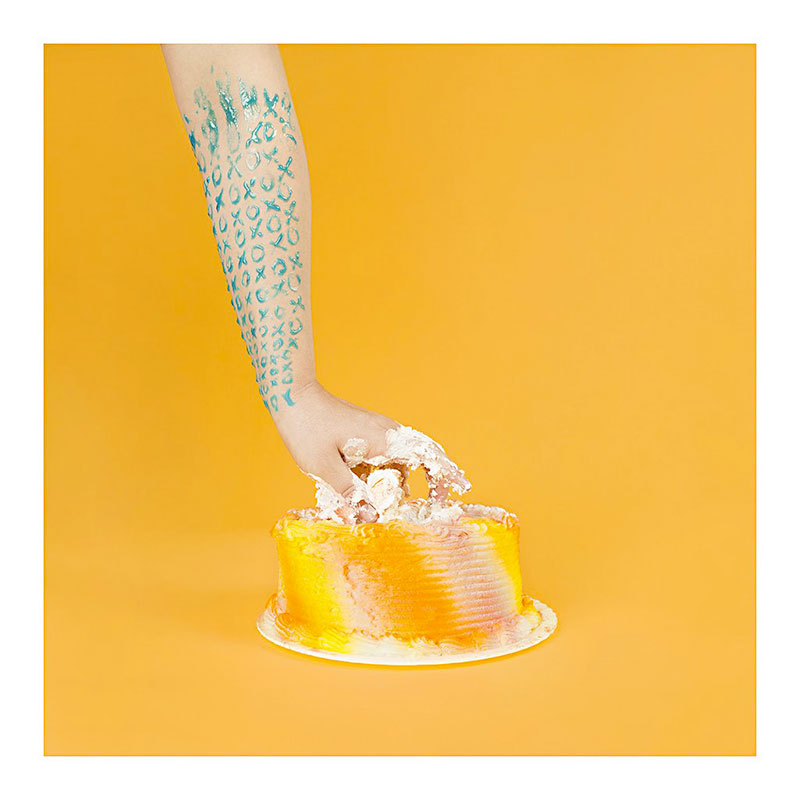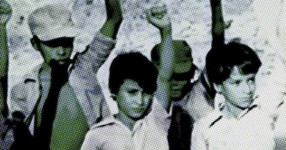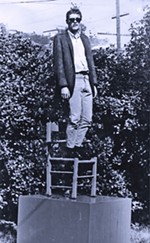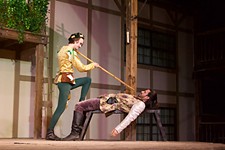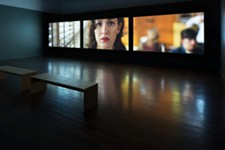"Femme National(e): Audrey Brown, Christina Coleman, Kasumi Chow / Desiree Michelle Espada, Emmy Laursen, Juliana Isabel Ramirez"
This group show is messy and a little berserk, but that's what makes it important and kindles joy in us
Reviewed by Sam Anderson-Ramos, Fri., Sept. 16, 2016
The layout of "Femme National(e)" has resulted in some resounding interactions between two particular parallel walls in Pump Project's gallery. On one wall are six photographs, each credited to both Kasumi Chow and Desiree Espada. Though separate pieces, the six are very much of a series, all of them in rich, neon hues, neatly composed and dramatically still, including the images that depict movement, such as Cake: truly, madly, in which a hand reaches from the upper edge of the frame and buries itself in a pretty cake. The forearm has been covered with inexplicable Xs and Os in what looks like green icing, some of which has been smeared into streaks. It's an upbeat image, I would say, a candy-orange cake and a candy-orange background, and yet the dramatic stillness remains, as though the model was asked to refrain from moving over multiple exposures, which may be exactly what happened. In another context, I may be disappointed by this, annoyed that the process was so inadequately hidden, but I like it here, because the tension in Chow and Espada's stillness is so edgy and satisfying, the way photography should be. Any photo is artificial, really, as though humans could so easily become frozen, when in fact it's only a trick of technology. To accept anything else is to be too blithely fooled. It's paper and ink, not reality. This basic premise feels happily emphasized here.
Two of the photos are portraits, one of which is Handholding, an awkward photo, like a prom picture, of a young woman holding a pair of plants, hands clasped in front of her. The woman looks aghast, as though some horrifying oversight has just been realized – "I kept calling them sir, but that was a woman!" or something worse, like "I left the baby in the car!" Handholding has the same movement/stillness tension that Cake: truly, madly does, but here it's even more intense, perhaps because the woman's shock is so totally captured. The background is a simple, hazy blue, but the woman's isolation seems to suggest a teeming, indifferent crowd, multitudes passing her by in the street, eager to attend to their own business, unaware of her personal turmoil.
The wall facing Chow and Espada's series seems dedicated to taking that subdued turmoil and throwing it in our face. Emmy Laursen's Untitled Assemblage, a mayhem of paper, fabric, string, paint, and any number of other things, reminds me of the moment in Breakfast Club when Ally Sheedy dumps all the "shit" in her purse out for everyone to see. Laursen's installation doesn't have the same neurotic darkness to it, but only because much of the items on hand suggest art-making, which is inherently optimistic. Otherwise, with its smears, mad curation, and cacophonous mounds of creative artifacts, the piece is wildly out of control, though it also impresses me as carefully crafted.
It's a pleasure to step back and take in these facing gallery walls, because they are so different yet speak to each other anyway: stillness and action, precise composition and precisely bonkers composition. However, these are only three of the six artists represented in the gallery and only a portion of what makes the show work. Every wall in the space is active, each piece busy with perspective and voice. "Femme National(e)" is messy and a little berserk, but so am I, and probably you are, too. These eccentricities are lucky ones – they make the work important. As with all of us, it's the untidiness in the details that kindles joy.
"Femme National(e): Audrey Brown, Christina Coleman, Kasumi Chow/Desiree Michelle Espada, Emmy Laursen, Juliana Isabel Ramirez"
Pump Project, 702 Shadywww.pumpproject.org
Through Sept. 25





